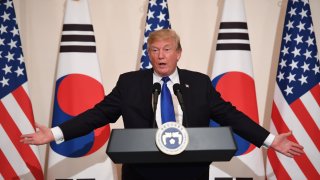A significant shift in global trade dynamics emerged this week as President Donald Trump announced a comprehensive new trade agreement between the United States and South Korea. This landmark US South Korea Trade deal reconfigures tariff structures and includes a substantial financial commitment, aiming to reshape economic ties between the two nations.
Central to the agreement is the reduction of tariffs on South Korean exports to the U.S., notably from an initial threat of 25% down to a uniform 15%. This revised rate applies broadly, with specific attention given to auto exports, where duties will also see a marked decrease. The announcement preceded a critical tariff deadline, providing immediate clarity for affected industries.
Beyond tariffs, the deal encompasses a colossal $350 billion pledge from South Korea for investments to be owned and controlled by the United States, as articulated by President Trump. This massive International Investment is touted as a strategic move to bolster American economic interests and create opportunities within the U.S.
However, interpretations of how this substantial fund will be utilized have varied between Washington and Seoul. South Korean President Lee Jae-myung indicated that the $350 billion would primarily facilitate the active entry of Korean companies into the U.S. market, particularly in sectors where South Korea possesses strengths, such as shipbuilding, semiconductors, and biotechnology.
Comparisons to previous Trade Negotiations with other Asian partners, such as Japan, highlight a pattern of complex financial commitments. U.S. Commerce Secretary Howard Lutnick reinforced the American perspective, stating that a significant portion of the profits from this investment, specifically 90%, would directly benefit the American people, echoing earlier discussions surrounding Japan’s similar investment pledge.
Further terms of the deal reveal South Korea’s commitment to purchase $100 billion worth of U.S. liquefied natural gas (LNG) and other energy products, alongside additional undisclosed investments. Conversely, the agreement stipulates that U.S. goods entering South Korea will not face any tariffs, establishing a clearer framework for cross-border commerce under this new Economic Policy.
Expert analysis, including insights from Oxford Economics and the Asia Society Policy Institute, suggests that while locking in a 15% tariff rate for auto exports could be perceived as a strategic victory for South Korea, questions remain regarding the long-term implications. Concerns have also been raised about the deal’s impact on the existing bilateral Free Trade Agreement, with some experts noting that Korea may not have received special treatment despite its FTA partner status.
Ultimately, this new agreement underscores South Korea’s ongoing commitment to strengthening industrial cooperation and solidifying its alliance with the United States. While certain sectors like steel, aluminum, and copper remain subject to existing tariff structures, the deal marks a pivotal moment in the bilateral Global Economy relationship, aimed at achieving mutually beneficial outcomes amidst evolving international trade landscapes.






Leave a Reply